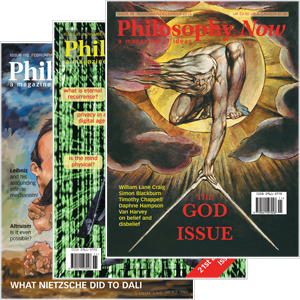
 Sign In
Sign In






Your complimentary articles
You’ve read
one of your four complimentary articles for this month.
You can read four articles free per month. To have complete access to the thousands of philosophy articles on this site, please
SUBSCRIBE NOW
[HEADING=3]Articles[/HEADING]
[HEADING=2]An Essay on Nothing[/HEADING]
[HEADING=3]
Sophia Gottfried meditates on the emptiness of non-existence.[/HEADING]
In philosophy there is a lot of emphasis on what exists. We call this
ontology, which means, the study of being. What is less often examined is what does
not exist.
It is understandable that we focus on what exists, as its effects are perhaps more visible. However, gaps or non-existence can also quite clearly have an impact on us in a number of ways. After all, death, often dreaded and feared, is merely the lack of existence in this world (unless you believe in ghosts). We are affected also by living people who are not there, objects that are not in our lives, and knowledge we never grasp.
Upon further contemplation, this seems quite odd and raises many questions. How can things that do not exist have such bearing upon our lives? Does
nothing have a type of existence all of its own? And how do we start our inquiry into things we can’t interact with directly because they’re not there? When one opens a box, and exclaims “There is nothing inside it!”, is that different from a real emptiness or nothingness? Why is nothingness such a hard concept for philosophy to conceptualize?
Let us delve into our proposed box, and think inside it a little. When someone opens an empty box, they do not literally find it devoid of any sort of being at all, since there is still air, light, and possibly dust present. So the box is not
truly empty. Rather, the word ‘empty’ here is used in conjunction with a prior assumption. Boxes were meant to hold things, not to just exist on their own. Inside they might have a present; an old family relic; a pizza; or maybe even another box. Since boxes have this purpose of containing things ascribed to them, there is always an expectation there will be something in a box. Therefore, this situation of nothingness arises from our expectations, or from our being accustomed. The same is true of statements such as “There is no one on this chair.” But if someone said, “There is no one on this blender”, they might get some odd looks. This is because a chair is understood as something that holds people, whereas a blender most likely not.
The same effect of expectation and corresponding absence arises with death. We do not often
.jpg)
.jpg)
.jpg)













.png)

